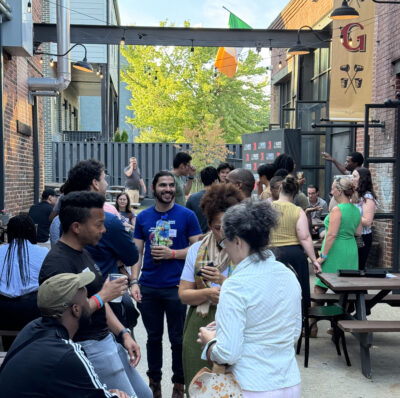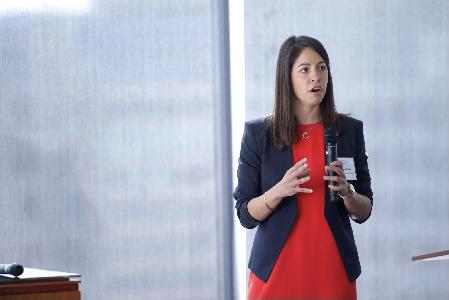Ten firms presented Thursday night at the Johns Hopkins University‘s Social Innovation Lab Demo Day.
The incubator’s 2013-2014 cohort gave short presentations in the Chevy Chase Bank Conference Center at Johns Hopkins Hospital, and then attendees offered feedback and voted for which budding entrepreneur would get a modest prize of $1,000 in seed funding. (The winner will be announced early this week.)
The featured presenters:
Sexual Health Innovations: The firm’s application, Callisto, is a sexual assault reporting and recording tool for college campuses. Founder Jessica Ladd cited statistics showing all but 24 of Baltimore’s estimated 3,800 college sex assaults go unreported. Reports made on the platform would automatically be sent to police or campus authorities, or a victim can save the report and send it when someone else reports the same assailant.
BMore Visible: The East Baltimore nonprofit plans to create Baltimore’s first “20/20 neighborhood” by offering accessible eye care in the neighborhood, starting with $25 eye exams, far less expensive than commercial eye exams in the area.
Baltimore HEARS Project: Currently recruiting for clinical trials, the HEARS (short for Hearing Health Care Equality Through Accessible Research & Solutions) Project aims to address the high cost of hearing interventions for seniors suffering from hearing loss. Currently, a hearing aid costs $5,000, takes six months to obtain and is not covered by insurance. The HEARS Project would employ community health workers to cut the cost to $125 a patient with only about an hour in wait time.
Aida Innovations: Aida aims to create assistive technology to help disabled individuals with daily tasks. The firm already has a patent pending on a chin-operated feeding device.
Kidenere: Kidenere addresses psychosocial and mental health burdens associated with kidney dialysis and promotes early screenings for kidney issues.The firm is conducting a study design at Good Samaritan Hospital. The program includes what founder Katrina Rios called a “daily wish,” a patient’s desire to do or learn something new (say, French), which then allows hospital personnel to connect them with other patients with the same interests.
SequeBase: SequeBase is a bioinformatics suite that lets researchers access existing data and save time in projects.
Osmosis: Creators of Osmosis, an existing “pop quiz” sort of mobile app for medical students, are working with the Baltimore nonprofit MERIT to develop a version of the software for grade school students, with practice SAT students written by medical student volunteers.
Quanitified Care: Described as a “CNet of medical devices,” the e-commerce platform would allow clinicians to evaluate compatibility, government approvals, insurance reimbursement amounts and available research on devices ranging from heart monitor apps to mobile ultrasound scanners.
Shelter++: A Baltimore version of the Philadelphia Sheltr homelessness access service, the app, website and SMS service will allow homeless and those who serve the homeless to find shelters and other services closest to them.
Healthify: Healthify would seek to reduce Medicaid money spent on issues caused by social needs (lack of food for example) and overwhelmed social workers by creating a mobile screening tool for clients to use while waiting. The tool would alert the social worker to refer the client to a relevant service, like food stamps
Before you go...
Please consider supporting Technical.ly to keep our independent journalism strong. Unlike most business-focused media outlets, we don’t have a paywall. Instead, we count on your personal and organizational support.
Join our growing Slack community
Join 5,000 tech professionals and entrepreneurs in our community Slack today!




